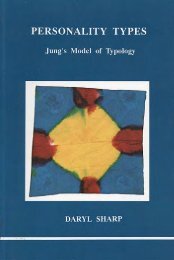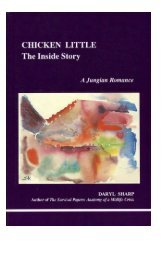Digesting Jung: Food for the Journey - Inner City Books
Digesting Jung: Food for the Journey - Inner City Books
Digesting Jung: Food for the Journey - Inner City Books
Create successful ePaper yourself
Turn your PDF publications into a flip-book with our unique Google optimized e-Paper software.
82 The Upside of Neurosis<br />
<strong>the</strong> world of <strong>the</strong> infant. The unconscious compensates this regression<br />
by producing symbols which, when understood objectively, that<br />
is, by means of comparative research, reactivate general ideas that<br />
underlie all such natural systems of thought. In this way a change of<br />
attitude is brought about which bridges <strong>the</strong> dissociation between<br />
man as he is and man as he ought to be. 67<br />
<strong>Jung</strong> called his attitude toward neurosis energic or final, since it<br />
was based on <strong>the</strong> potential progression of energy ra<strong>the</strong>r than <strong>the</strong><br />
Freudian view that looked <strong>for</strong> causal or mechanistic reasons <strong>for</strong> its<br />
regression. The two views are not incompatible but ra<strong>the</strong>r complementary:<br />
<strong>the</strong> mechanistic approach looks to <strong>the</strong> personal past <strong>for</strong> <strong>the</strong><br />
cause of psychic discom<strong>for</strong>t in <strong>the</strong> present; <strong>Jung</strong> focused on difficulties<br />
in <strong>the</strong> present with an eye to future possibilities. Thus, instead<br />
of delving deeply into how and why one arrived at an impasse,<br />
he asked: “What is <strong>the</strong> necessary task which <strong>the</strong> patient will<br />
not accomplish?” 68<br />
<strong>Jung</strong> did not dispute Freudian <strong>the</strong>ory that Oedipal fixations can<br />
manifest as neurosis in later life. He also acknowledged that certain<br />
periods in life, and particularly infancy, often have a permanent and<br />
determining influence on <strong>the</strong> personality. But he found this to be an<br />
insufficient explanation <strong>for</strong> those cases in which <strong>the</strong>re was no trace<br />
of neurosis until <strong>the</strong> time of <strong>the</strong> breakdown.<br />
Freud’s sexual <strong>the</strong>ory of neurosis is grounded on a true and factual<br />
principle. But it makes <strong>the</strong> mistake of being one-sided and exclusive;<br />
also it commits <strong>the</strong> imprudence of trying to lay hold of unconfinable<br />
Eros with <strong>the</strong> crude terminology of sex. In this respect Freud<br />
is a typical representative of <strong>the</strong> materialistic epoch, whose hope it<br />
was to solve <strong>the</strong> world riddle in a test-tube. 69<br />
The psychological determination of a neurosis is only partly due to<br />
an early infantile predisposition; it must be due to some cause in <strong>the</strong><br />
present as well. And if we carefully examine <strong>the</strong> kind of infantile<br />
67 “The Philosophical Tree,” Alchemical Studies, CW 13, par. 473.<br />
68 “Psychoanalysis and Neurosis,” Freud and Psychoanalysis, CW 4, par. 570.<br />
69 “The Eros Theory,” Two Essays on Analytical Psychology, CW 7, par. 33.










